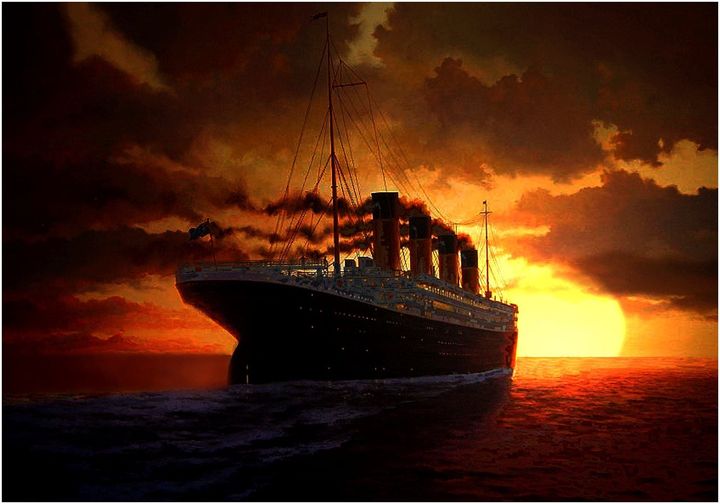The Sunday Sermonette – The Last Sunset.

Easter, 1912, fell on April 7th. England’s magnificent cathedrals would have been packed, their soaring, columned interiors filled with the sweet bouquet of incense and majestic choral music. But on the RMS Titanic, its luxurious interiors were being readied for her maiden voyage.
30,000 fresh eggs, 800 cases of shelled walnuts, and 15,000 bottles of ale, stout, champagne, and fine liqueurs were being loaded. Five grand pianos were being tuned. The fifty-phone switchboard was being installed. Exquisitely carved furniture, dozens of potted palms, and crate after crate of fine china, silver, and crystal were all brought aboard. This activity surprised no one. After all, the Titanic was a floating city—an “unsinkable” floating city. Nevertheless, by the following Sunday, April 14th, she was nearing her final destination—irrevocable disaster.
On the morning of April 14th, divine services for 1st and 2nd class passengers of the Protestant faith were held in the 1st Class dining room. That service was led by Captain Smith. 1st and 2nd-class passengers of the Catholic faith attended Mass in the 2nd-class dining room.
Due to the strict immigration laws of the time, 3rd-class passengers were excluded from those services. They were kept separate because they were the only passengers subject to rigorous health screening upon arrival in New York. Most 3rd-class passengers were Irish and Scandinavian, so separate Catholic and Lutheran services were held for them.
In 1912, providing religious services for the Buddhist, Greek Orthodox, Russian Orthodox, Muslim, and Jewish passengers aboard the Titanic was not a high priority for the White Star Line. However, I would like to believe that Isidor and Ida Straus did celebrate Passover that year, which began on April 1st.
April 14th began with divine services for most passengers. But after that, each Class enjoyed its own individual delights. In 1st Class, there was genteel conversation in the lady’s elegant writing room and cards, cigars, and port in the men’s mahogany-paneled lounge.
In 2nd Class, happy singing and songs around the piano were the norm, with time left for reading a good book and taking afternoon tea. Spirited laughter and high jinks would have been the norm in 3rd Class. Thus, the afternoon of the 14th passed. Survivors remembered many things about that Sunday. But to a person, they all remembered the last sunset of that dying day.
In the gathering darkness, the sky was aflame with color—lavender, tangerine, and indigo. The vast shimmering horizon seemed endless, as did the dreams and aspirations of the ship’s passengers and crew. The luxurious Titanic, the marvel of its age, steamed serenely into the night as icy seawater gently danced against her hull.
On April 21st, the Sunday after the Titanic sank, Edward Talbot, the Bishop of Winchester, England, ended his sermon with these words: “The Titanic, name, and thing, will stand for a monument and warning to human presumption. When has such a mighty lesson against our confidence and trust in power, machinery, and money been shot through the nation?”
One hundred and twelve years later, don’t these words still ring true? Don’t we trust our own power, negating the power of Father God? Don’t we trust the machinery of our “unsinkable” lifestyles to get us through the day, pushing Father God aside? Don’t we place our confidence in the almighty dollar and not the Almighty God? And if so, like the Titanic, are we blissfully sailing into our last sunset?
Ponder this and go forth.
